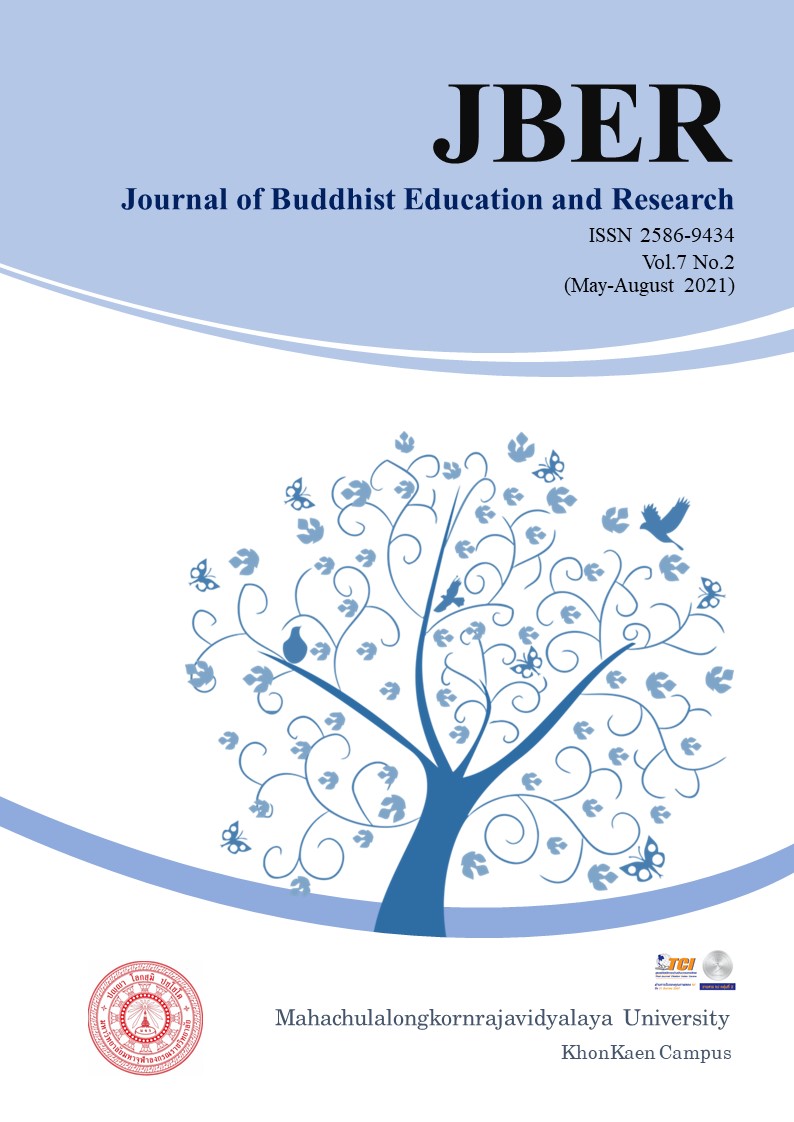THE BUDDHIST TEACHING METHODS TO PROMOTE LEARNING BEHAVIOR ON SOCIAL STUDIES SUBJECT OF THE UPPER SECONDARY STUDENTS, PHRASONGSAMAKKI SCHOOL, NAKHON PHANOM PROVINCE
Keywords:
The Buddhist Teaching Methods; Learning Behavior; Social Studies SubjectAbstract
The objectives of this research were: to study the condition, compare and suggest the guideline on the development of Buddhist teaching methods for promoting learning behavior in ‘Social Studies’ subject of the upper secondary school students in Phrasongsamakki School, Nakhon Phanom Province. This study was carried out by means of the quantitative research. The samples consisted of 103 students. The tool used to collect data was a questionnaire. The statistics used for data analysis were: Frequency, Percentage, Mean, Standard Deviation, Independent Samples Test (t-test), and One-Way Analysis of Variance (F-test) and Scheffe' s method.
The research results were as follows:
The Buddhist teaching methods for promoting learning behavior in social studies subject of the upper secondary school students in overall was at a high level. The aspects with a high level rated were ‘Curriculum’, ‘Learning Management’ and ‘Learning Media’. Those with a moderate level were ‘Learning Activities for Student Development’ and ‘Assessment and Evaluation’.
The comparative results based on the student factors indicated that the students with difference in status had their attitude towards the Buddhist teaching methods for promoting learning behavior indifferently. The comparative results of the students’ attitude towards the Buddhist teaching methods for promoting learning behavior, classified by classes, in overall was not different. The consideration of the studied aspects indicated the statistical difference with the significance level of 0.05.
The development guidelines were as follows: 1) the curriculum should contain up-to-date contents; 2) teachers should inform students about learning objectives and goals before learning; 3) teachers should use a variety of technology materials; 4) teachers should organize field trips; 5) teachers should have measurements and assessments based on real conditions.
References
กรมวิชาการ กระทรวงศึกษาธิการ. (2552). หลักสูตรแกนกลางการศึกษาขั้นพื้นฐานพุทธศักราช 2551. กรุงเทพฯ: ชุมนุมสหกรณ์การเกษตรแห่งประเทศไทย.
บุญชม ศรีสะอาด. (2546). การพัฒนาหลักสูตรและการวิจัยเกี่ยวกับหลักสูตร. กรุงเทพฯ : สุวีริยาสาส์น.
พระกฤษณะ วชิรญาโณ (วภักดิ์เพชร). (2560). การจัดการเรียนการสอนกลุ่มสาระสังคมศึกษา ศาสนา และวัฒนธรรม ในการส่งเสรีมคุณธรรมจริยธรรมแก่นักเรียนมัธยมศึกษาตอนปลาย ในเขตเทศบาลนครอุดรธานี. วิทยานิพนธ์พุทธศาสตรมหาบัณฑิต. บัณฑิตวิทยาลัย มหาวิทยาลัยมหาจุฬาลงกรณราชวิทยาลัย.
พระดิฐวัฒน์ อภิวฑฺฒนธมฺโม (ทิพคุณ). (2561). พุทธวิธีการจัดการเรียนการสอนกลุ่มสาระสังคมศึกษา ศาสนา และวัฒนธรรม ระดับมัธยมศึกษา ของโรงเรียนสังกัดเทศบาลนครขอนแก่น. วิทยานิพนธ์ปริญญาพุทธศาสตรมหาบัณฑิต สาขาวิชาการสอนสังคมศึกษา. มหาวิทยาลัยมหาจุฬาลงกรณราชวิทยาลัย.
วิภาพรรณ พินลา. (2560). แนวทางการจัดการเรียนรู้วิชาสังคมศึกษา เพื่อพัฒนาทักษะการคิดอย่างมีวิจารณญาณสำหรับผู้เรียนในศตวรรษที่ 21. วารสารปาริชาต. 30(1). 13-34.
สำนักนโยบายและยุทธศาสตร์ สำนักงานปลัดกระทรวงศึกษาธิการ. (2563). แผนยุทธศาสตร์กระทรวงศึกษาธิการ. สืบค้นเมื่อ 15 มีนาคม 2563. จาก https://www.sobkroo.com/articledetail.asp?id=1145.
อุทัย วรเมธีศรีสกุล และคณะ. (2561). พุทธวิธีการเรียนการสอน. วารสารบัณฑิตศึกษามหาจุฬาขอนแก่น. 5(1), 71-81.





